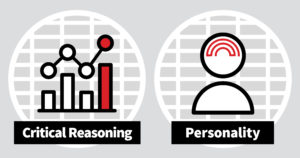
One of the primary tasks of leadership is to effectively and efficiently allocate an organization’s resources. In business, this requires leaders to make critical decisions that ultimately determine the success or failure of the organization. However, making good business decisions alone is not enough to guarantee success. Effective leaders must also have the interpersonal skills to get along with others and build high-performing teams. Both critical reasoning skills and interpersonal skills are effective predictors of performance. Logically then, employers who care about job performance should want to know two things: do my employees make good decisions and do they have the interpersonal skills to effectively function? The best way to answer these questions is by using assessments.
Cognitive assessments, such as the Hogan Business Reasoning Inventory (HBRI), are some of the most robust predictors of job performance. Any job that requires solving problems, evaluating the consequences of various solutions, or weighing solutions against each other can benefit from cognitive assessments that accurately measure one’s critical reasoning skills. Effective critical reasoning requires three things:
- A clear-minded view of the problem – Too often leaders spend time solving the wrong problem or problems that aren’t actually problems at all.
- A rational analysis of possible solutions to the problem – Some solutions are bound to be more effective than others, so being able to analyze those solutions rationally and objectively is important.
- An accurate forecast of each solution’s consequences – Some solutions may cause future problems, so the cost and impact of the various solutions must be considered.
Using cognitive assessments to measure job candidates across these three core areas tells us how a person will go about making decisions and whether they will be effective in doing so. However, cognitive assessments don’t give us a full picture of how someone is going to work in a modern collaborative workplace. That’s where personality assessments come into play.
Personality assessments give us valuable insights into an individual’s day-to-day behavior. Using scientific assessments like the Hogan Personality Inventory (HPI), the Hogan Development Survey (HDS), and the Motives, Values, Preferences Inventory (MVPI), employers get answers to three key questions about the individual:
- How will they perform when they are at their best?
- What behaviors will derail their chances of success?
- What motivates and drives them?
The answers to these questions are critical when determining if someone is a good fit for a particular job. A job candidate can possess the desired interpersonal skills to perform the job, but they won’t be happy if their core values don’t match the values of the organization. On the other hand, someone can be a perfect match for an organization from a values standpoint but lack the interpersonal skills that lead to success in that role.
Cognitive assessments and personality assessments measure two different things, and that’s good news for employers. This means that both cognitive and personality assessments add useful information about potential job candidates with little redundancy. By assessing job candidates in terms of both their decision-making and interpersonal skill, hiring managers give themselves the best chance at hiring high-performers.
 One of the primary tasks of leadership is to effectively and efficiently allocate an organization’s resources. In business, this requires leaders to make critical decisions that ultimately determine the success or failure of the organization. However, making good business decisions alone is not enough to guarantee success. Effective leaders must also have the interpersonal skills to get along with others and build high-performing teams. Both critical reasoning skills and interpersonal skills are effective predictors of performance. Logically then, employers who care about job performance should want to know two things: do my employees make good decisions and do they have the interpersonal skills to effectively function? The best way to answer these questions is by using assessments.
Cognitive assessments, such as the Hogan Business Reasoning Inventory (HBRI), are some of the most robust predictors of job performance. Any job that requires solving problems, evaluating the consequences of various solutions, or weighing solutions against each other can benefit from cognitive assessments that accurately measure one’s critical reasoning skills. Effective critical reasoning requires three things:
One of the primary tasks of leadership is to effectively and efficiently allocate an organization’s resources. In business, this requires leaders to make critical decisions that ultimately determine the success or failure of the organization. However, making good business decisions alone is not enough to guarantee success. Effective leaders must also have the interpersonal skills to get along with others and build high-performing teams. Both critical reasoning skills and interpersonal skills are effective predictors of performance. Logically then, employers who care about job performance should want to know two things: do my employees make good decisions and do they have the interpersonal skills to effectively function? The best way to answer these questions is by using assessments.
Cognitive assessments, such as the Hogan Business Reasoning Inventory (HBRI), are some of the most robust predictors of job performance. Any job that requires solving problems, evaluating the consequences of various solutions, or weighing solutions against each other can benefit from cognitive assessments that accurately measure one’s critical reasoning skills. Effective critical reasoning requires three things: